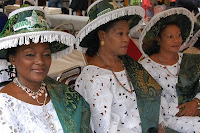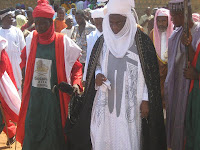Argungu Fishing Fesival
 The festival began in the
year 1934, as a mark of the end of the centuries old hostility between the Sokoto
Caliphate and the Kebbi Kingdom. The Argungu Fishing Festival is an
annual four day festival in north-western Nigerian state of Kebbi. The festival
usually takes place in Argungu, the capital city of Argungu Emirate Council.
The geo-physical nature and characteristics of the festival site in Argungu are
river areas (matanfada, mala, gamji), irrigation, and orchards (lambu in
hausa). The majority of fishermen are the followers of Islam and Predominant
farmers. Kanta mesium is the main historical centre in Argungu for visitors
across the globe. Tourists from different destination troupe to Argungu just to
witness the occasion. On the final day of the festival, a competition is held
in which thousands of men and women line up along the river and at the sound of
a gunshot, all of them jump into the river and have an hour to catch the
largest fish. The winner can take home as much as 7,500 US dollars. Competitors
are only allowed to use traditional fishing tools and many prefer to catch fish
entirely by hand.
The festival began in the
year 1934, as a mark of the end of the centuries old hostility between the Sokoto
Caliphate and the Kebbi Kingdom. The Argungu Fishing Festival is an
annual four day festival in north-western Nigerian state of Kebbi. The festival
usually takes place in Argungu, the capital city of Argungu Emirate Council.
The geo-physical nature and characteristics of the festival site in Argungu are
river areas (matanfada, mala, gamji), irrigation, and orchards (lambu in
hausa). The majority of fishermen are the followers of Islam and Predominant
farmers. Kanta mesium is the main historical centre in Argungu for visitors
across the globe. Tourists from different destination troupe to Argungu just to
witness the occasion. On the final day of the festival, a competition is held
in which thousands of men and women line up along the river and at the sound of
a gunshot, all of them jump into the river and have an hour to catch the
largest fish. The winner can take home as much as 7,500 US dollars. Competitors
are only allowed to use traditional fishing tools and many prefer to catch fish
entirely by hand.
Eyo Festival
The Eyo Festival,
otherwise known as the Adamu Orisha Play, is a Yoruba festival unique to
Lagos, Nigeria. In modern times, it is
presented by the people of Lagos as a tourist event and due to its history, is
traditionally performed on Lagos Island. The first procession in Lagos was on the 20th of
February, 1854, to commemorate the life of the Oba Akintoye. The word
"Eyo" also refers to the costumed dancers, known as the masquerades
that come out during the festival. The origins of this observance are found in
the inner workings of the secret societies of Lagos. It is widely believed that
the play is one of the manifestations of the customary African revelry that
serves as the forerunner of the modern carnival in Brazil. On Eyo Day, the main
highway in the heart of the city (from the end of Carter Bridge to Tinubu
Square) is closed to traffic, allowing for procession from Idumota to the Iga
Idunganran palace. The white-clad Eyo masquerades represent the spirits of the
dead, and are referred to in Yoruba as "agogoro Eyo" (literally:
"tall Eyo"). A
full week before the festival (always a Sunday), the ‘senior’ eyo group, the
Adimu (identified by a black, broad-rimed hat), goes public with a staff. When
this happens, it means the event will take place on the following Saturday.
Each of the four other ‘important’ groups — Laba (Red), Oniko (yellow), Ologede
(Green) and Agere (Purple) — take their turns in that order from Monday to
Thursday.
Here is a list of Prohibited
Items at the festival: Commercial motorcycles, Bicycles, Sandals, Suku:
A hairstyle that is popular among the Yorubas, one that has the hair converge
at the middle, then shoot upward, before tipping downward, Smoking (The
masquerades are known to beat people who use any of the prohibited items at
sight with their staffs.)
 Leboku is the annual New Yam
Festival celebrated in Ugep, Nigeria to honor of the earth goddess and the
ancestral spirits of the land in Ugep, one of the five settlements of Yakurr.
The three week festival is the culmination of many events: the beginning of the
yam harvest, a time to appease the gods and ancestors, a public parade of
engaged maidens, a commemoration of events that led to the migration from the
Yakurr ancestral home to the present site, and a period of holiday in the
Yakurr traditional calendar (mid-August through mid-September). According to oral history, Leboku Cultural festival is as old as
the Yakurr people. It started with the earliest settlers on the land. Tracing
the history of the Yakurr people and the origin of the Ugep International New
Yam Festival (Leboku). The Yakurr calendar runs from August to
July. During the Leboku, people keep away from intense farming activities and
exchange visits with their families. The Leboku is also meant to usher in
peace, good health and prosperity. Click for more information: http://en.wikipedia.org/wiki/Leboku
Leboku is the annual New Yam
Festival celebrated in Ugep, Nigeria to honor of the earth goddess and the
ancestral spirits of the land in Ugep, one of the five settlements of Yakurr.
The three week festival is the culmination of many events: the beginning of the
yam harvest, a time to appease the gods and ancestors, a public parade of
engaged maidens, a commemoration of events that led to the migration from the
Yakurr ancestral home to the present site, and a period of holiday in the
Yakurr traditional calendar (mid-August through mid-September). According to oral history, Leboku Cultural festival is as old as
the Yakurr people. It started with the earliest settlers on the land. Tracing
the history of the Yakurr people and the origin of the Ugep International New
Yam Festival (Leboku). The Yakurr calendar runs from August to
July. During the Leboku, people keep away from intense farming activities and
exchange visits with their families. The Leboku is also meant to usher in
peace, good health and prosperity. Click for more information: http://en.wikipedia.org/wiki/Leboku
Igue Festival
 The Bini have a long lineage of Obas, and
Igue is also an occasion to celebrate Ugie-Evhoba among other occasions. During
this period, the anniversary of their deaths is celebrated by the Bini, and for
seven days propitiations are made to the spirits of the departed Obas. This is
done to invoke their blessing on the reigning monarch and their family and
subjects.
The Bini have a long lineage of Obas, and
Igue is also an occasion to celebrate Ugie-Evhoba among other occasions. During
this period, the anniversary of their deaths is celebrated by the Bini, and for
seven days propitiations are made to the spirits of the departed Obas. This is
done to invoke their blessing on the reigning monarch and their family and
subjects.The Igue festival, which is a period for offering thanks to the gods for sparing their lives and to ask for blessings, is also used for offering sacrifices to some shrines in the palace. During this period, chieftaincy title holders display their Eben emblem in the Ugie dance as they appear in their traditional attire, according to the type of dress the Oba bestowed on individual chiefs during the conferment of title, while the Oba seats majestically in the royal chamber (Ogiukpo). Confirmation and conferring of titles on deserving citizens by the Oba are carried out during the festival, although this could be done any time the Oba deems fit. While it is also a period to drive away evil spirits (Ubi) and bring blessings (Ewere) to every home in the kingdom, it is a period traditionally set aside by the Bini to thank the gods for blessings on the Oba, his palace, harem and subjects. Ancestral gods are worshipped for protection and propitiation done in the various palace societies. The shrines are considered holy and therefore defied traditionally. The Oba pays homage at the shrines and he is accompanied by some of his chiefs. Indeed, it is a period of merriment, rituals and dancing.
During the seven days of elaborate traditional and cultural activities, Bini chiefs are seen in their enviable traditional regalia, including the Iloi (Queens) in their Okuku (hairdo). It is a rare occasion of their public appearance, where the Oba's stalwarts (Ifietes) are seen in active service. Traditional dances like Esakpaide, Ohogho and above all the display of Eben by the chiefs while dancing and paying homage to the Oba in Ogiukpe at Ugha Oba or the Oba's chamber. For more information: http://www.edofolks.com/html/pub142.htm
The New Yam festival of the Igbo (Igbo: Iwa ji) is an annual harvest festival by the Igbo people held at the end of the rainy season in early August. The Iwa ji festival (literally "new-yam eating") is practiced throughout West Africa (especially in Nigeria and Ghana) and other African countries and beyond, symbolizing the conclusion of a harvest and the beginning of the next work cycle. The celebration is a very culturally based occasion, tying individual Igbo communities together as essentially agrarian and dependent on yam.
 Yams are the first crop to be harvested, and are the most
important crop of the region. The evening prior to the day of the festival, all
old yams (from the previous year's crop) are consumed or discarded. The next
day, only dishes of yam are served, as the festival is symbolic of the
abundance of the produce.
Yams are the first crop to be harvested, and are the most
important crop of the region. The evening prior to the day of the festival, all
old yams (from the previous year's crop) are consumed or discarded. The next
day, only dishes of yam are served, as the festival is symbolic of the
abundance of the produce. Traditionally, the role of eating the first yam is performed by the oldest man in the community or the king (igwe). This man also offers the yams to god, deities and ancestors. It is believed that their position bestows the privilege of being intermediaries between their communities and the gods of the land. The rituals are meant to express the gratitude of the community to the gods for making the harvest possible, and they are widely followed despite more modern changes due to the influence of Christianity in the area.

The day is symbolic of enjoyment after the cultivation season, and the plenty is shared with friends and well-wishers. A variety of festivities mark the eating of new yam. Folk dances, masquerades, parades, and parties create an experience that some participants characterize as "art"; the colorful festival is a spectacle of exhibited joy, thanks, and community display.
Palm oil (mmanu nri) is used to eat the yam. Iwa ji also shares some similarities with the Asian Mid-Autumn Festival, as both are based on the cycles of the moon and are essentially community harvest festivals.




.jpg)





































